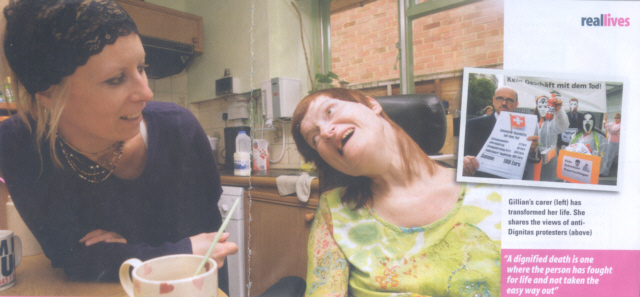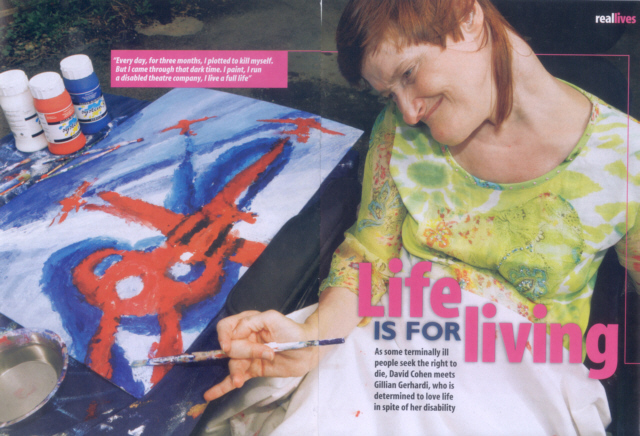|
||
|
|
 Life is for living
Life is for living
reallives
As some terminally ill people seek the right to die, David Cohen meets Gillian Gerhardi, who is determined to love life in spite of her disability
| "Every day for three months, I plotted to kill myself. But I came through that dark time. I paint, I run a disabled theatre company, I live a full life" |
© Newhall Publications Limited - Candis November 2006
Gillian Gerhardi watched the television coverage of Dr Anne Turner's controversial assisted suicide last January and felt a barely controllable anger rise in her belly. "Murderers!" she muttered. "We know all about those Dignitas people! They give you a 40-minute consultation and then pass you a lethal prescription —they are the lowest of the low."
Gillian, 50, a disabled mother of two children and a graduate who lives with her disabled husband Vic, 56, pondered: how can this Dignitas bandwagon be stopped? Two years ago, she planned to expose their "inhumane practices" by posing as a "suicide tourist" who would pull out at the last moment, but eventually decided it would be too terrifying for her. "For a mad moment the other night, I thought again about taking that trip to Zurich," she says. "I thought to myself that things have got much worse, and that the only way to make my point was to book myself into their death flat, and then blow myself and Dignitas founder, Ludwig Minelli, sky high. I would become," she laughs wistfully, "the first anti-suicide suicide bomber."
Her body ravaged with cerebral palsy and now multiple sclerosis, the degenerative condition that will eventually kill her, Gillian, whose arms are too weak to lift anything heavier than a TV remote, is an unlikely activist. Yet she is vociferous in her opposition to the Swiss clinic, admitting, through slurred speech, that as politically incorrect as it may sound, she feels angry with 66-year-old Dr Turner. "Dr Turner had at least three years to live, she was not even disabled and she certainly wasn't anywhere near as bad as I am. Yes, her brain disorder meant she was going to deteriorate, but by killing herself, she was saying that life as a disabled person is not worth living. "But I say — having been where Dr Turner was — life is worth living. When I was diagnosed with multiple sclerosis five years ago, I rapidly lost my ability to walk, to feed myself, to use the loo without assistance, and I was suicidal too. Every day, for three months, I plotted to kill myself. I was going to ride my motorised wheelchair down on to the high road and into the path of a lorry. "But by obtaining a full-time care assistant funded by Social Services, and by re-casting my life to see beyond my useless body, I came through that dark time. I paint, I run a disabled theatre company, I live a full life. The tragedy is — so could have Dr Turner."
| "By killing herself, Dr Turner was saying that life as a disabled person is not worth living. But I say - having been where Dr Turner was - life is worth living" |
But some 60 miles to the south, having also seen the broadcast of Dr Turner's last journey, Michael Irwin, 74, a retired Surrey GP, expresses very different views. Irwin, one of the 673 British members of Dignitas, recalled his own trip to Zurich where he accompanied a terminally ill friend to this self-same death flat. He had already been struck off the medical register in September 2005 for planning to assist a friend and fellow campaigner, Patrick Kneen, in ending his life. "I don't regret that trip at all," Irwin says. "I remember landing with my friend at the airport and the pilot wishing us all 'a pleasant onward journey' and my friend saying, 'If only he knew where
I was going.' She was amazing. So cheerful, so light, so determined. Although I had helped five other people to get their paperwork in order for Dignitas, I'd never seen anyone actually commit suicide before. I found it fascinating. As a doctor, you become emotionally detached. Being with her, I was amazed by how dignified and peaceful her death seemed to be." But Irwin admits that he would have felt ambivalent about accompanying someone like Dr Turner because, unlike his friend, she had not entered the final six months of her life. "I felt sad for Dr Turner because if the law in this country was changed, then she wouldn't have had to take her life prematurely. She went because she was afraid she'd lose the ability to swallow, because to commit suicide through Dignitas, which operates under Swiss law, you have to be able to swallow the barbiturates on your own."
| "Death with dignity? Dignitas provides lethal barbiturates (top) and many terminally-ill people have ended their lives in their Zurich flat (middle). Founder Ludwig Minelli (below) advocates the right to die but one UK member, retired GP Michael Irwin (below right) was struck off last year for helping plan an assisted suicide." |
 Dr
Turner is said to be the 42nd Briton to die with Dignitas since
it was founded in 1998, but only the third, after Reginald Crew
and John Close, to invite in the media. Her suicide has re-ignited
the debate about assisted suicide in the UK. In May, Lord Joffe's
bill, which aims to legalise assisted suicide for the terminally
ill, again went before the House of Lords but its progress was
blocked. One argument advanced by advocates of Lord Joffe's bill
is that it will introduce stricter safeguards, because organisations
like Dignitas help people die who are merely depressed.
Dr
Turner is said to be the 42nd Briton to die with Dignitas since
it was founded in 1998, but only the third, after Reginald Crew
and John Close, to invite in the media. Her suicide has re-ignited
the debate about assisted suicide in the UK. In May, Lord Joffe's
bill, which aims to legalise assisted suicide for the terminally
ill, again went before the House of Lords but its progress was
blocked. One argument advanced by advocates of Lord Joffe's bill
is that it will introduce stricter safeguards, because organisations
like Dignitas help people die who are merely depressed.
The case of Robert and Jennifer Stokes, the Bedfordshire couple who committed suicide with Dignitas in 2003, shocking their families, provoked a storm of criticism. The couple were not terminally ill, but with their health declining they were said to be worried that nobody would look after them if the other died. Cases like these led Gillian Gerhardi, who lives in Aylesbury, Buckinghamshire, to contemplate an undercover trip to expose Dignitas. All it took was a £45 enrolment fee attached to a two-page letter and Dignitas posted her details of the documents she would need: birth certificate, marriage certificate, and two doctors' letters showing proof of her medical condition.
In Zurich, she would meet with a Dignitas doctor who would check she was of sound mind, and that her intention was to die, before handing her a prescription for a lethal barbiturate. Then she would be driven to the Dignitas flat where the barbiturates would be prepared by a nurse, she would take them, and 25 minutes later, she would be dead.
But Gillian's opposition to assisted suicide goes beyond the flawed cases like the Stokes couple. She is against it even if the patient is terminally ill. And to grasp why, you have to understand the philosophy she has fashioned out of her roller-coaster life. Gillian was born prematurely with Athetoid cerebral palsy to a farming family in Hertfordshire. She was the eldest of four — her siblings were able-bodied — and despite her impaired speech and being unable to walk until five, she attended a normal school. By her early 20s, Gillian had graduated with a BA in social administration and had met and married Vic, a disabled computer consultant, whose cerebral palsy was less obvious than her own. They would go on to have two strapping able-bodied boys,
Brett, now 28, and Chris, 25. "Gillian was extremely active," says Vic. "When we went dancing, she was the one holding me up rather than the other way round. She lived a full life — her cerebral palsy made it impossible to hold down a regular job, but she ran a theatre company, designed and sold Christmas cards, and brought up the children."
The news in 2001 that Gillian had developed a degenerative condition came as a devastating shock. "One day my legs felt so weak I could hardly walk," recalls Gillian. "I went to see a specialist who told me, 'You've got multiple sclerosis. There is nothing we can do. Your muscles will gradually lose all connection with your brain, you will get weaker, but it could take three years or 25 years before you die.'"
Gillian's deterioration was frighteningly rapid. She was soon confined to a wheelchair, unable to walk or even eat unassisted, and needing a hoist to get her into her bed and on to the toilet. For two years, she fought hard to adjust, but psychologically, she realised she was starting to crumble.
"I'm a control freak and couldn't handle it that I had become so reliant on my family," she says. "I became terribly depressed for months, I would wake every day and plot how I was going to kill myself. Eventually, with Vic's help, and with counselling, I began to realise that what I needed was more help from Social Services. All I had to do was ask. With a full-time carer, the change in my quality of life was enormous." Gillian believes that one of the biggest problems that disabled and terminally ill people face is that society makes them feel valueless, and they are unaware of the help they can command. "If the Stokes couple had realise that more care was available, the maybe they would not have gone to Zurich," she says. "But part of it is coming to terms with what had happened and accepting that I could still do what I did before, but differently. For example, I realised that although I couldn't walk, I can still get around because I have a wheelchair and hoist. Vic and I still go out to the movies, the theatre — we even went to Manhattan last year."
Dr Irwin admits that activists like Gillian make a valuable contribution, but says that there will always be a small number who will opt for assisted suicide to be able to "die with dignity".
But Gillian insists that the phrase "dying with dignity" is terribly misleading. "A dignified death is one where the person has has fought for life and not taken the easy way out. I understand people are frightened of having a bad death full of suffering. But where did we get this idea that we are due a so-called dignified death? "Far more important is that we live with dignity. And that means enduring hard times, overcoming obstacles, and seeing value in people who are terminally ill and disabled. I, for one, intend to be around for some time yet."

| Gillian's carer (above) has transformed her life. She shares the views of anti-Dignitas protesters (right) | "A dignified death is one where the person has fought for life and not taken the easy way out" |
